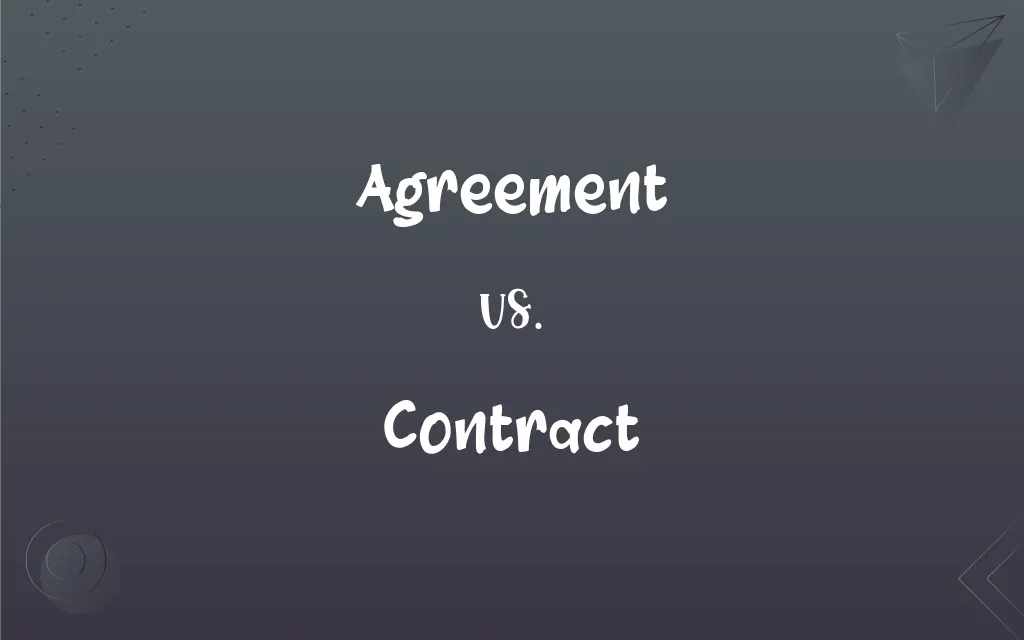Agreement vs. Contract: What's the Difference?
Edited by Janet White || By Harlon Moss || Updated on October 24, 2023
An agreement is a mutual understanding between parties, while a contract is a legally binding agreement with specific terms.

Key Differences
An agreement is a broad term that refers to any understanding or arrangement reached between two or more parties. It can be verbal or written and can pertain to any subject. A contract, on the other hand, is a specific type of agreement that is legally binding and can be enforced in a court of law.
In everyday conversations, people often use the word agreement when they come to some sort of understanding with another party, whether it's as simple as agreeing on a place to meet or as complex as defining the terms of a business deal. Contracts, however, are often reserved for situations where the terms are formally set out, and there are legal consequences for not fulfilling those terms.
Both agreement and contract denote some form of consensus between involved entities. While an agreement can be informal and even implied in certain situations, a contract must be explicit, with clear terms and conditions.
The nature of an agreement can be fleeting and might not have legal consequences. For instance, you might agree with a friend on where to have lunch. A contract, in contrast, is something that parties enter into, often with the intention of it being legally enforceable, like when you sign a lease for an apartment.
It's important to note that while all contracts are agreements, not all agreements are contracts. For an agreement to become a contract, it often needs consideration (something of value exchanged), an intention to create legal relations, and other elements depending on the jurisdiction.
ADVERTISEMENT
Comparison Chart
Nature
Broad, can be informal
Specific, legally binding
Enforceability
Not always legally enforceable
Legally enforceable
Formality
Can be verbal or written
Usually formal and written
Consequences
Might not have legal penalties
Can have legal penalties for breach
Requirements
Mutual understanding
Offer, acceptance, consideration, intention to be legal
ADVERTISEMENT
Agreement and Contract Definitions
Agreement
An agreement is the act of coming to a consensus or harmony.
The team's agreement on the strategy was crucial for success.
Contract
A contract is a legally binding agreement between two or more parties with enforceable obligations.
She signed a contract to buy the house.
Agreement
An agreement can denote an informal arrangement without legal enforceability.
Their agreement to meet at the café was casual.
Contract
A contract is a formal written or spoken agreement.
The artist entered a contract with the gallery.
Agreement
An agreement is a mutual understanding between two or more parties.
We reached an agreement to share the chores.
Contract
A contract can refer to an arrangement to provide goods or services.
The construction company secured a contract to build the bridge.
Agreement
An agreement can refer to the harmony of opinion or feeling.
The couple was in agreement about their wedding plans.
Contract
A contract is a binding pledge or promise.
He's under contract to complete the work by next month.
Agreement
An agreement is the absence of contradiction between two things.
There was an agreement between the evidence and the witness's testimony.
Contract
A contract is the act of decreasing in size or becoming constricted.
The muscle contracts when stimulated.
Agreement
The act of agreeing
When did the agreement take place?.
Contract
An agreement between two or more parties, especially one that is written and enforceable by law.
FAQs
What makes a contract different from an agreement?
A contract is a specific type of agreement that is legally binding with enforceable terms.
Do contracts always need to be written?
No, while many contracts are written, some can be verbal but proving them can be challenging.
What is an agreement in simple terms?
An agreement is a mutual understanding between two or more parties.
Is every agreement a contract?
No, while all contracts are agreements, not all agreements are contracts.
Can an agreement be verbal?
Yes, an agreement can be verbal or written.
Can an agreement have legal consequences?
Not always, only if it meets the criteria to be considered a contract.
Are there penalties for breaking a contract?
Yes, contracts often have legal penalties for breach.
How does one make an agreement into a contract?
By ensuring elements like offer, acceptance, consideration, and intention to create legal relations are present.
Why are contracts important in business?
They provide clarity, define obligations, and offer legal protection to parties.
Can one party change a contract without the other party's agreement?
No, a contract's terms generally cannot be unilaterally changed without mutual consent.
Do all contracts need consideration to be valid?
In many jurisdictions, yes, contracts need consideration to be legally binding.
What is the primary purpose of a contract?
To establish clear terms and legally bind parties to those terms.
Can an email be considered a contract?
If an email has elements of a contract (offer, acceptance, etc.), it can be considered binding.
Is a mutual agreement the same as a mutual contract?
No, while a mutual agreement indicates consensus, a mutual contract is legally binding.
How can an agreement be proved?
Through written documents, witnesses, or other evidence indicating mutual understanding.
Can an agreement be informal?
Yes, agreements can be informal and even implied.
Is a handshake agreement legally binding?
It depends on the intent and the specifics, but some handshake agreements can be seen as contracts if they fulfill contract elements.
Can a contract be terminated by mutual agreement?
Yes, parties can mutually agree to terminate a contract.
Why are verbal agreements risky?
Because they can be hard to prove and may lack clarity on terms.
Can a contract be implied without an explicit agreement?
Yes, some contracts can be implied based on conduct and circumstances.
About Author
Written by
Harlon MossHarlon is a seasoned quality moderator and accomplished content writer for Difference Wiki. An alumnus of the prestigious University of California, he earned his degree in Computer Science. Leveraging his academic background, Harlon brings a meticulous and informed perspective to his work, ensuring content accuracy and excellence.
Edited by
Janet WhiteJanet White has been an esteemed writer and blogger for Difference Wiki. Holding a Master's degree in Science and Medical Journalism from the prestigious Boston University, she has consistently demonstrated her expertise and passion for her field. When she's not immersed in her work, Janet relishes her time exercising, delving into a good book, and cherishing moments with friends and family.































































